13
November 2001
![]()
2. „Turkey’s Economic Woes”, a team from the IMF is in Turkey assessing the country's efforts to recover from its desperate economic plight. The IMF and World Bank have bailed out Turkey twice before already to the tune of billions of dollars. But will they agree to a third package of measures?
3. „Turkey and EU fail to bridge gap on ESDP”, the third round of ESDP talks held in London on Nov. 7 failed to bridge gap on core disputes existing between Turkey and the EU.
4. „Denktas warns of post-EU accession scenarios of Greek Cypriots”, Turkish Republic of Northern Cyprus (KKTC) President Rauf Denktas warned Monday of post-European Union accession scenarios of the Greek Cypriot leadership.
5. „Turkish deputy leader accuses EU of "delaying tactics"”, Turkey's Deputy Prime Minister Devlet Bahceli on Tuesday accused the European Union of being biased against Turkey and deliberately delaying its membership bid.
6. “As Cem’s remarks continue to reverberate”, editor Semih Idiz comments on Foreign Minister Ismail Cem's manner on theCyprus issue.
1. – AFP – „Turkish prisoner dies of self-inflicted burns in protest”:
ANKARA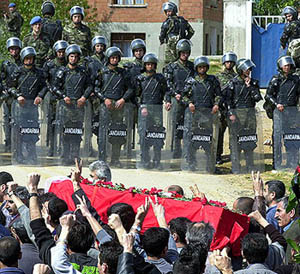
A Turkish prisoner who was on hunger strike against controversial prison
reforms, has died after setting himself alight in protest against a
police raid last week, a leading human rights group said Monday.
Muharrem Cetinkaya, a 30-year-old left wing extremist inmate, died of his burns in an Ankara hospital, after setting fire to himself November 5 in an Ankara prison, a spokeswoman for the Turkish Human Rights Association (IHD) told AFP. Cetinkaya -- who had been on hunger strike for a year -- took the dramatic step in protest against the police, who raided a house in Istanbul's Kucukarmutlu district last Monday. Four people, all supporters of the movement against prison reforms, burned to death in the house after the raid.
Last week, two other prisoners burnt themselves to death in two different prisons in the north west of Turkey, to protest against the police raid. The hunger strike was launched throughout Turkish prisons by mainly left-wing extremist inmates in October last year against the introduction of new prisons with tighter security. The protestors claim that new prison cells for up to three people, which replace large halls housing 60, increase social alienation and leave prisoners more vulnerable to attack. A total of 41 people, both prisoners and their supporters, have starved themselves to death. Over the weekend, 18 Turkish non-governmental organisations, including the IHD, called on the government to enter into talks with the prisoners to reach a solution to the hunger strike.
"Turkish police detain nine in second raid on hunger strikers":
ISTANBUL 
Turkish riot police on Tuesday detained nine people in a raid on
an Istanbul district housing left-wing hunger strikers, a week after
a similar security operation which left four people dead, the city's
police chief said. Backed by armoured vehicles, bulldozers, ambulances
and fire engines, dozens of officers moved into the Kucukarmutlu district,
in the city European quarter, at 6:00 am (0400 GMT), the Anatolia news
agency reported.
"The operation was launched against those who have set up barricades on the streets and disrupted public order on the pretext of the hunger strike," Istanbul police chief Hasan Ozdemir said after the operation, according to the agency. The poor neighbourhood of Kucukarmutlu serves as a base for hunger strikers who have been fasting for the past several months in support of a year-old hunger strike in Turkish prisons in protest at controversial jail reforms. Anatolia said that with a police helicopter flying overhead, officers cleared all the makeshift barricades on the roads and moved out of the area by 8:30 am (0630 GMT).
The agency added that supporters of the strikers had pelted officers with stones and threw molotov cocktails, while officers responded with tear gas during the operation. Ozdemir announced later that nine people, four of them hunger strikers, were detained. Last Monday, riot police carried out its first raid against the hunger strikers in Kucukarmutlu, in which four people died in a house which burned down. The prison hunger strike was launched by mainly far-left inmates across Turkish jails in October last year to protest the introduction of new jails with cells for three people at most.
The move spread outside prisons as inmates released due
to their deteriorating health continued to fast and were joined by other
supporters. A total of 41 people, including both prisoners and outside
supporters of the strike, have starved themselves to death. The protestors
say the new prison cells, which replaced large dormitories housing up
to 60 people, deepen social alienation and leave prisoners more vulnerable
to mistreatment. The government has ruled out a return to the dormitory
system arguing that the crowded compounds were the main reason behind
lax security in Turkish jails, where riots and hostage-taking incidents
had become commonplace.![]()
2. – Radio Netherlands – „Turkey’s Economic Woes”:
ISTANBUL 
A team from the IMF is in Turkey assessing the country's efforts
to recover from its desperate economic plight. The IMF and World Bank
have bailed out Turkey twice before already to the tune of billions
of dollars. But will they agree to a third package of measures?
Small manufacturing centres account for the overwhelming majority of the Turkey's industrial output. Employing a dozen or so workers, these companies supply the country's industrial giants. It's here that the country's economic crisis has hit hardest. For Mehmet Aslan's metal work company, things seem to go just from bad to worse.
"There's no work, it's terrible. Things just go from bad to worse. Last year was bad but this year is just unbelievable. I thought things would get better in the autumn but after September it was just another blow," he says.
Economic Fall-Out
Stories like Mehmet's are typical according to Economics Professor Taner Berksoy of Bilgi University. He says with the country already reeling from its worst economic crisis in living memory, the economic repercussions of September 11th have hit the economy particularly hard and the worst is not over yet.
"One direct effect concerns the morale of the decision makers here, dealing with the financial markets. All around the world the attacks cause pessimism in financial markets and particularly in the emerging markets. In Turkey, we felt this effect almost immediately. Our economy was already in deep recession, which means that the unfavourable impact of the terrorist events was much heavier here. In fact, the tourism industry took a lot of cancellations and I am sure our exports will show the impact within month or so."
Debt Problems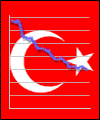
In the wake of last February's crisis, impromptu demonstrations
by small businessmen have spread like wildfire across the country. They
had pinned their hopes on a 17 billion-dollar loan deal from the IMF
and World Bank. However, the economy is contracting by 8.5 percent and
there are growing fears of another currency devaluation. This threatens
to push Turkey into default especially as much of its debt is dollar
denominated. Further international assistance is seen as the country's
only hope.
Meanwhile, Turkey has come out in support of the United States' campaign against the Taliban. The air base of Incirlik is playing a crucial role in the air operation. Turkey has also committed itself to sending soldiers to Afghanistan. But such support comes a price, says journalist Sinan Gokcen of the daily Hurriyet.
Stronger Hand
Turkey is seeing this as a unique opportunity to maker its hand
stronger in the game. Turkey is talking about now 10 billion dollars
in aid but not from financial institutions like the IMF. It's expecting
a 10 billion-dollar financial aid package from G7 countries. Another
financial benefit Turkey can enjoy is American Military credit FMS.
Turkey owes 5 billion dollars to America, I think they are going to
just cancel this debt. This is not official: it's still just speculation"
Whether Turkey can avoid another crisis and the government
will provide financial assistance to the most vulnerable parts of economy
appears dependent on further international assistance. The events September
the 11 have added to the country's economic woes but with Turkey playing
an increasingly crucial role in the war on terrorism its new found importance
could give the country the necessary extra political leverage on the
international community to secure the much needed funds. ![]()
3. – Turkish Daily News – „Turkey and
EU fail to bridge gap on ESDP”: 
The third round of ESDP talks held in London on Nov. 7 failed to
bridge gap on core disputes existing between Turkey and the EU. But
both sides agreed to hold the next round of talks in Ankara on Nov.
26. In the meantime EU is prepared to announce the operational functioning
of ESDP committees on Dec. 14 during Laeken summit. This will pave the
way for the EU to act independently from NATO, an undesirable development
for Turkey too.
ANKARA / Lale Sariibrahimoglu 
Holding the third round of talks this time in London on Nov. 7, Turkey
and Britain, acting on behalf of the European Union, as well as the
United States, acting as an observer, failed to bridge their differences
of opinion on core issues concerning accommodating Turkish concerns
within the European Security and Defence Policy (ESDP). But in an attempt
to find a last minute compromise, the parties have agreed to meet in
Ankara on Nov. 26. Informed sources, however, do not rule out that the
talks may continue even after the Laeken summit.
Turkey, a NATO member but not the member of the European
Union, has not so far agreed to lift its veto over granting assured
access of NATO's assets and capabilities to the planned European Army
unless its demands are met. 
In the meantime, EU leaders due to meet in Laeken, Belgium, to hold
their summit on Dec. 14, plan to announce that the already established
Political and Security Committee as well as the Military Committee,
core institutional infrastructures of the European Army, will become
operational. If a solution is not found to ease Turkish concerns before
the European Union formally activates these institutional mechanisms,
it will mean that the union will formally be able to launch, as a start,
humanitarian intervention to low intensity crisis without seeking NATO's
assets and capabilities. This small step to be launched at Laeken without
seeking NATO's capabilities will culminate in the year 2003 with the
EU's deployment of about 60,000 rapid reaction force members to areas
including Turkey's proximity, for conflict resolution or for crisis
management. This will be an undesirable development for Turkey too.
Laeken will thus pave the way for the European Union to act independently from NATO by establishing gradually its own capabilities. Such a development will displease the United States which has been fearing that Turkey`s resistance to lift its veto over assured access to NATO's assets and capabilities will finally lead the EU member countries such as France to establish their own cell of operational planning within an EU force, acting independently from NATO, thus leading to an eventual weakening of the transatlantic ties.
Gathering in Brussels in November last year, defense ministers from EU nations formally committed to providing the manpower and equipment needed to marshal the force within 60 days for a peacekeeping or peacemaking operation for up to a year in a trouble spot as far as 4,000 kilometers from Europe's shores. The force aims to be capable of undertaking the full range of conflict-prevention, humanitarian and crisis-management missions, known as the Petersberg Tasks, defined in the Treaty on Europe Union. Turkey has pledged 6,000 troops, aircraft and ships to the force making it the fifth largest contributor to the EU force.
London talks fail to yield result on core issues 
There have been couple of technical issues discussed in London talks
between Turkey, the United States and Britain. They included Turkey's
request to participate within the military secretariat of the ESDP on
a permanent basis with a military representative. Though the European
Union accepts a Turkish liaison officer, there are signals that European
Union may accept a permanent Turkish military representation.
But on the two core issues, none of the parties have been able to bridge the deep gaps that Ankara says depend purely on the political willingness of the union that it has been lacking.
In the case of autonomous EU operations that do not require NATO assets, once Turkey states that the operation lies within geographic proximity to its territory or affects its vital security interests, the European Union must assure Ankara of participation in the decision-making process and the operation. Turkey seeks an automatic invitation to be made by the ESDP for the operations to be staged in Turkey`s proximity such as Balkans that Turkey does not have any bilateral dispute but has a close interest.
But according to a Turkish diplomat, the European Union, whose 11 members are also members of NATO, has been hiding behind the Nice summit conclusions, under which all the 15 members cannot make a binding decision over giving assurances to Turkey. Nice conclusions say that the non-EU member states are invited to the autonomous EU led operations upon invitation by the European Council. Under this rule if one member of the union objects a non-EU member country's participation in such an operation, it means that Turkey cannot take part. Turkey on its part says that the planned treaty of the European Union could be modified to ensure Turkey's automatic participation in such operations.
One senior Turkish diplomatic source says that unlike what the European Union argues, such a change in the planned treaty to accommodate Turkish requests has a political obstacle rather than a legal one.
"How can one expect Greece to agree for a change in the treaty to meet Turkish concerns. On the contrary, Greece will attempt to use ESDP mechanisms to have the union meddle in the bilateral disputes, such as Cyprus and the Aegean. Similarly countries such as France and Belgium, seeking to set up an independent operational cell other than NATO, do not agree on automatic invitation of Turkey to autonomous operations," stresses the same source.
Due to the same legal arguments, the European Union as a whole refrains from giving strong assurances -- veto power -- to Turkey that a European Army should refrain from crisis management in matters where any of the NATO allies is involved. One of Turkey's deepest concerns is the possibility that the European Union, at times when it does not seek NATO assets and capabilities in any possible military intervention, would meddle in bilateral Turkish-Greek disputes as well as on divided Cyprus on Northern Iraq, or on Georgia, making Turkey ineffective in those issues related to what it terms as vital national security interests.
US disappoints Turkey 
Turkey, being left alone it its diplomatic struggle against the European
Union, to which it is a candidate member nation, with no prospects of
early membership, feels a deep disappointment with its main ally, the
United States.
One source says that during all talks conducted with Britain, U.S. delegation has been acting neutrally instead of assisting Turkey in meeting its concerns.
During a summit meeting held between U.S. President George W. Bush and British Prime Minister Tony Blair in Camp David this year in February, Washington promised London not to be an obstacle for the creation of the ESDP and its army, recalls one Turkish diplomat.
"This has been the reason why the U.S. delegation at talks stay neutral instead of playing the role of a facilitator. We are very disappointed with the U.S. attitude," says the same diplomat.
Though the current deadlock between Turkey and the European Union will affect the remaining five non-EU NATO members Norway (Refused to be a member of the European Union), Iceland as well as the Czech Republic, Hungary and Poland, Turkish diplomats say those countries stand still and make no fight at all. But the obvious reason for the three former communist countries failure to give backing to Turkey is their guarantee to become full members to the European Union in the coming years.
It is not also ruled out that before the planned Nov.
26 talks in Ankara on ESDP, a summit meeting among the Turkish military,
Prime Minister Bulent Ecevit and Foreign Minister Ismail Cem may take
place. The summit meeting may design a strategy to prevent the ESDP
crisis from effecting Turkey's relations with the European Union as
a whole, which has already been strained on Cyprus as well as on Turkey's
failure in meeting its obligations to start full membership talks with
the union. ![]()
4. – Turkish Daily News – „Denktas warns
of post-EU accession scenarios of Greek Cypriots”:
Turkish Republic of Northern Cyprus (KKTC) President Rauf Denktas warned
Monday of post-European Union accession scenarios of the Greek Cypriot
leadership. Greek Cypriot President Glafcos Clerides, on the other hand,
turned down a direct "heart-to-heart" talks offer by Denktas
saying such a process could be possible only after the Turkish Cypriot
leader returned to the United Nations-sponsored negotiations process.
Receiving a group of veterans from the 1974 Turkish intervention in Cyprus, Denktas said Greek Cypriots launched a campaign of annihilation of their Turkish partners in 1963 with the aim and intention of achieving union of the island with Greece (enosis) and have never deviated from that goal.
The Turkish Cypriot president said with the 1974 Turkish intervention Turkey has clearly told Greek Cypriots that it won't allow the union of the island with Greece and would stand for the defense of the rights and liberties of the Turkish Cypriot people, as well as its legitimate rights on the island, but since 1974 Greek Cypriots have resorted to every means of achieving their aim.
He said the European Union membership bid by Greek Cypriots was also a move designed to achieve enosis through the EU door and warned that Greek Cypriots have very dangerous post-EU accession scenarios.
"They aim to bring Turkey and the EU to loggerheads on Cyprus," Denktas said and warned that he feared after achieving EU membership Greek Cypriots would provoke an armed confrontation with Turkish troops and Turkish Cypriots.
"They will do that. Greece will do that. They will aim to create a situation so that they can utilize it and bring in the United States and others to ask Turkey to withdraw its troops from Cyprus. This would be a very dangerous game that would make Turkey and EU adversaries on Cyprus. They will not be able to stage this plot," Denktas said.
The remarks of Denktas, on the other hand, shed some light on why after 27 years after the 1974 Turkish intervention Turkey for the first time declared recently that if EU decides to make Greek Cypriots a member as the representative of the entire island, Turkey would take some serious measures and would consider annexation of northern Cyprus.
Turkey raised the stakes over Cyprus last week when Prime Minister Bulent Ecevit said Ankara could "annex" the island's Turkish Cypriot north if Greek Cypriot-administered southern Cyprus, a frontrunner for membership, joins the bloc before the political stalemate is resolved.
Denktas said Cyprus was important for Turkey not only because of the existence of Turkish Cypriots, but for Turkey's own strategic interests and security as well.
In a related development, Turkish Defence Minister Sabahattin Cakmakoglu said northern Cyprus was indispensable to Turkish security.
"Cyprus will not be a concession for Turkey to enter the EU," Cakmakoglu said: "Cyprus is not just an island where our ethnic kin live. It is the one security area in the eastern Mediterranean where Turkey, surrounded by Greek islands full of hostility, can breathe easily."
Cakmakoghlu was responding to allegations that Cyprus has become a burden for Turkey and a problem blocking the country's EU accession.
Denktas, stressing the same point, said was unfortunate but even some Turkish newspapers were considering the Cyprus problem as an obstacle for Turkey's EU membership and complained that there was hardly few stories this year in the Turkish press about the anniversary celebrations of the 1974 Turkish intervention.
'Dialogue of deaf' on Cyprus 
Motherland Party leader, Deputy Prime MInister Mesut Yilmaz, one of
the strongest supporters of Turkey's EU bid, declared last Sunday in
frustration that Turkey's talks with the EU over Cyprus were "a
dialogue of the deaf."
"We're in a dialogue of the deaf with the EU over Cyprus," said Yilmaz, who oversees Turkey's EU relations.
"We are telling the EU, 'If you guarantee (Greek Cypriots) membership with the present divided state you give no motive for them to sit down with us and find a solution,'" he said.
"The EU needs to openly say Cyprus won't become a member until a political solution is agreed upon by both sides," Yilmaz said.
The EU has called for a settlement on the divided island but has not made it a precondition for Cyprus' membership.
Annexation could threaten stability in the eastern Mediterranean and may ruin Ankara's own decades-long wish to join the EU. Turkey became a candidate in late 1999.
The EU has said Turkey must support the U.N.'s efforts on the island and carry out economic and political reforms, especially in human rights, to begin membership talks.
Greece says no EU expansion without Cyprus 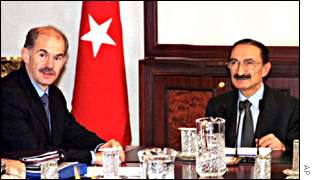
Meanwhile, Greek Foreign Minister George Papandreou was quoted on Monday
as saying that Greece cannot approve any future EU expansion if it does
not include Cyprus. Athens expects its other EU partners to respect
an accord that the island will be able to join regardless of whether
its political division is settled.
"The Greek parliament has sent us the message that it cannot ratify expansion without Cyprus. There is the Helsinki (EU summit) decision, and we are just asking that decision be upheld," Papandreou told the Ta Nea newspaper.
Clerides says 'No, but..." 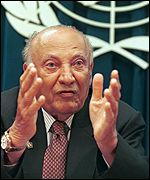
At the United Nations on Sunday, Greek Cypriot leader Clerides asked
Turkey to drop threats to annex northern Cyprus and appealed to Denktas
to return to stalled U.N.-brokered talks at reuniting the island.
The talks between the Turkish and Greek Cypriots broke down late last year after Denktash demanded he be acknowledged as Clerides' equal.
Clerides is recognized internationally as the president of the "sole legitimate state" on Cyprus.
Clerides said he would be happy to accept the face-to-face talks offer of Denktas, but only under the umbrella of the U.N.
The Greek Cypriot leader said he did not want to substitute
the negotiating process under U.N. Secretary-General Kofi Annan for
direct talks with Turkish Cypriot leader Rauf Denktas. ![]()
5. – AFP – „Turkish deputy leader accuses EU of "delaying tactics"”:
ANKARA 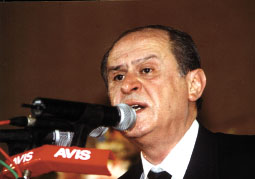
Turkey's Deputy Prime Minister Devlet Bahceli on Tuesday accused
the European Union of being biased against Turkey and deliberately delaying
its membership bid. In remarks to members of his parliamentary party,
hours before the EU issues annual progress reports on 13 candidate countries,
he said: "It has become clearer that concepts and status constantly
invented for Turkey are nothing but delaying tactics."
In its report on Turkey, expected to be published at 1600 GMT in Strasbourg, the EU executive will tell Ankara that it had not yet made sufficient political reforms or progress on the Cyprus issue to be admitted to membership talks. "We, the MHP, condemn and reject the biased and ill-intentioned attitude of the European Union. We invite the Union to bear a more open, sincere and honest attitude," Bahceli, the leader of the far-right Nationalist Action Party (MHP) charged. Turkey was made into an EU candidate in December 1999, but not allowed to join 12 other candidates in membership talks until it had met the EU's conditions over human rights, democracy and Cyprus.
Cyprus, divided since 1974 when Turkey invaded and occupied the northern third of the island in response to a Greek Cypriot coup, is among the first wave of new members the Union plans to accept by 2004. If Cyprus joins the bloc before a political settlement, it would mean the admission of a divided country part of which is occupied by Turkey. Last month, European Commission president Romano Prodi said that the lack of a resolution to the division on the island would not pose an obstacle to Cyprus' accession. The MHP leader charged the Union was ignoring the rights of the Turkish Cypriot community while promising the Greek Cypriot's full membership before a settlement.
"There is no legal, moral or friendly explanation
to this attitude," he said. Tension has recently risen over the
island, with Turkish leaders warning against the internationally-recognized
Greek Cypriot south entering the Union before the island is reunified.
In a recent newspaper interview, Turkish Prime Minister Bulent Ecevit
said for the first time that Ankara would consider annexing the breakaway
Turkish state in northern Cyprus if that is the case. ![]()
6. – Milliyet – “As Cem’s remarks continue to reverberate”:
Editor Semih Idiz comments on Foreign Minister Ismail Cem's manner on theCyprus issue.
Foreign Minister Ismail Cem's recent remarks, in which
he suggested thatTurkey was on the brink of a major decision of Cyprus,
and would take thiseven at a cost to itself, are continuing to reverberate,
and in doing soare generating different theories as to why he uttered
such a thing in thefirst place. 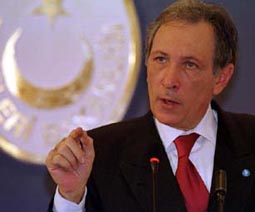
The background to these words was of course the visit by the president
ofthe European Commission, Romano Prodi, to southern Cyprus, where he
made it clear that Cyprus (meaning the Greek Cypriot administration)
was first in line for EU membership in the Union's next stage of enlargement.
The fact that Prodi did not bother to meet Turkish Cypriot President Rauf Denktas while on the island appeared merely to enhance the EU's mood ofdefiance in this regard. The general feeling is that Cem's remarks, uttered during his presentation to the Parliamentary Planning and Budget Commission, reflected a counter defiance and carried a simple message: Namely that Turkey will not be cowed by the EU position and will take a step that will balance the fact that the Greek Cypriots have been admitted as a member to the EU ahead of Turkey, even if this has detrimental effects on Ankara's ties with the Union.
The core of this message is believed to contain the notion that Turkey is preparing to annex Northern Cyprus, even if this means that it has to sever ties with the EU. It is natural, therefore, that Cem should have been strongly criticized by supporters of Turkey's eventual membership to the EU, who do not believe that paying the cost for Cyprus in terms of Ankara's EU ties is an appropriate way to progress. Neither do they believe that it is possible to consider this approach as a successful foreign policy administration, designed to bring the best benefit to Turkey and Turkish Cypriots.
The feeling of those who hold this view is also that.
Cem's remarks, some are calling them an 'outburst', have had the added
negative effect of showing Turkey to be the bellicose side which is
prepared to do things that are less than rational. Hard-line nationalist
elements are of course more than pleased with Cem here, although the
curious thing is that he has always been associated with a more liberal
outlook, and say that this is the 'best language for those wily Europeans
who need to be taught a good lesson about how determined the Turks can
be on certain issues.' There is little need to go into and analyze this
perspective because it is there for all to behold. ![]()